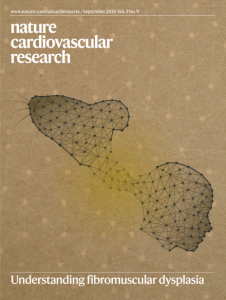Investigating the Molecular Mechanisms of Fibromuscular Dysplasia

(Image: Fibromuscular dysplasia paper from Kovacic Lab featured on the cover of Nature Cardiovascular Research)
Fibromuscular dysplasia (FMD), a poorly understood disease that predominantly affects women, can result in serious consequences including stroke, myocardial infarction, and death. Although it was first reported in 1938 and with a prevalence of up to 5% in females, there is no specific treatment and very little is known about its cause. Through our DEFINE-FMD study we have identified a specific network of genes that appears important for causing FMD – here we will dissect the functional roles of this gene network, to make meaningful biologic inroads on this disease.
Therapeutic Manipulation of Endothelial to Mesenchymal Transition
This project seeks to leverage several novel discoveries made by our team to define the core biologic mechanisms of endothelial to mesenchymal transition (EndMT) in atherosclerosis and other cardiovascular conditions, to understand how we can manipulate EndMT to promote healing or prognosis after procedures such as vascular grafting, and ultimately to develop novel therapeutic strategies for cardiovascular disease.
